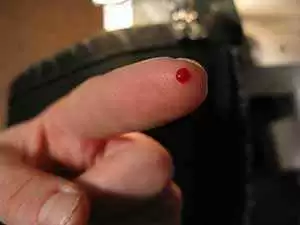Celiac.com 10/23/2013 - Celiac disease remains seriously under diagnosed in adults and, in many places, often takes years and even decades to diagnose.
 A team of researchers recently evaluated the usefulness of an on-site rapid fingertip whole blood point-of-care test (POCT) that would help primary workers to spot patients who might benefit from further diagnostic tests for celiac disease.
A team of researchers recently evaluated the usefulness of an on-site rapid fingertip whole blood point-of-care test (POCT) that would help primary workers to spot patients who might benefit from further diagnostic tests for celiac disease.
Celiac.com Sponsor (A12):
The research team included Alina Popp, Mariana Jinga, Ciprian Jurcut, Vasile Balaban, Catalina Bardas, Kaija Laurila, Florina Vasilescu, Adina Ene, Ioana Anca and Markku Mäki. They are affiliated with the University of Medicine and Pharmacy “Carol Davila,” the Institute for Mother and Child Care “Alfred Rusescu,” Central University Emergency Military Hospital “Dr. Carol Davila,” Str. Mircea Vulcanescu, in Bucharest, Romania and with theTampere Center for Child Health Research, University of Tampere and Tampere University Hospital, in Tampere, Finland.
Because celiac disease often runs in families, the team tested 148 healthy relatives of 70 Romanian index cases with biopsy-proven celiac disease, for a total of 87% of all first-degree family members, with a median age 36 years, for the presence of circulating autoantibodies.
In addition to using the POCT to measures blood erythrocyte self-TG2-autoantibody complexes on site, the team took blood samples for later evaluation of serum IgA-class endomysial antibodies (EMA).
The then tested all EMA-positive samples for transglutaminase 2 antibodies (TG2-IgA). They conducted blind analysis of all serological parameters in a centralized laboratory with no knowledge of the on site POCT result. The team recommended endoscopic small intestinal biopsies for all POCT- or EMA-test positive subjects.
Overall, 12 of 148 (8%) first-degree relatives showed positive results for the POCT, and all twelve tested serum EMA-positive. Only one other test subject showed a positive EMA test result.
All remaining 135 healthy first-degree relatives showed negative results for both POCT and EMA.
Four subjects who tested positive for both POCT and EMA were negative for TG2-IgA. Ten out of thirteen of the antibody-positive subjects consented to endoscopy.
In all, eight out of nine first-degree relatives with celiac-type mucosal lesions of grade Marsh 2 (n = 3) or Marsh 3 (n = 6) showed positive results with the POCT.
The three POCT-positive subjects refused endoscopy tested positive for both EMA and TG2-IgA.
The fingertip whole blood rapid POCT could be a simple and cheap way to spot biomarkers and promote further testing for faster diagnosis of celiac disease.
The team is calling for further studies in adult case-finding in specialized outpatient clinics and in primary care.
Source:
- Open Original Shared Link






Recommended Comments